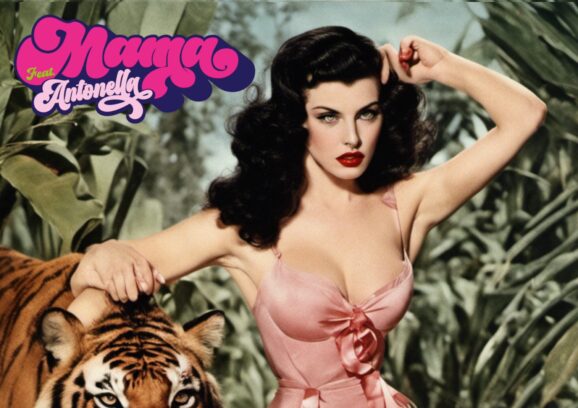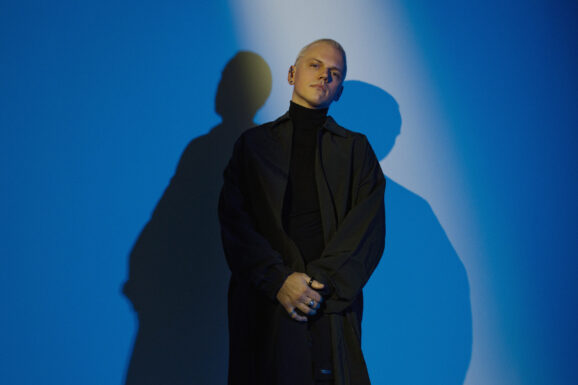Neil Young & Crazy Horse’s Barn is an album based equally on perspective and purpose. Witness the photograph on the front cover, for instance, an eye-opening shot in which a rose-tinted blue sky dwarfs the musicians pictured in front of the restored 19th-century barn where the music was recorded with mobile facilities. That setting is absolutely striking, as much (if not more so) than the impeccable sound on the ten tracks co-produced by the Canadian rock icon with long-time technical collaborator Niko Bolas.
Captured in an atmosphere of amiable camaraderie, the friendly likes of which may only be possible for collaborators with the fifty-year-plus history of these men, the songs here represent a collective “Journey Through The Past.” Young engages in fond remembrances of his history, from a place of bonafide contentment, interspersed with intermittent glances at the world at large, that mitigates both the sentimentality and insularity in the material. With soft strains of harmonica and echoes of vintage solo concerts, the very first cut sounds instantly familiar but, to the credit of all involved, “Song of the Seasons” does not come off saccharine. The track is, in fact, both honest and heartfelt.
That said, devoted fans of as well as casual listeners may ultimately find much of what follows too informal for its own good. The impromptu air of tunes like “Tumblin’ Through The Years” suggests the author was composing on the spot or had only brought minimal song sketches to the sessions in the Rocky Mountains this past summer. A more broad perspective suggests the former Buffalo Springfielder and erstwhile friend of Crosby, Stills, and Nash simply did not want to stray too far from the point(s) he wants to make in such a song or, worse yet, destroy the fragile mood.
That ‘in the moment’ concept includes the by necessity includes the chemistry of spontaneous musicianship too. Yet the relatively abbreviated lengths of most cuts suggest a willful decision by Young not to stretch out much in the company of multi-instrumentalist Nils Lofgren, bassist Billy Talbot and drummer Ralph Molina; on the self-consciously clever title “Canerican,” the quartet introduces some measure of improvisation to the proceedings, but with a running time of just over three minutes, nothing too involved develops. Even the longest track here, “Welcome Back” at 8:24, doesn’t contain extended fireworks the likes of which have often earmarked the best work of Young and The Horse (see 1975’s Zuma).
This number might better have been a solo acoustic arrangement because its lyrics so clearly take precedence over the music. Not that the words are focused for great lucidity or the performance tailored for dramatic impact: at this point, as the next to the last cut in the roughly thirty-five minutes playing time, the rough edges so replete in these recordings hearken directly to much of ‘The Ditch Trilogy:’ Time Fades Away, Tonight’s The Night and especially On The Beach. Along those lines, it’s well to recall the logic of those records didn’t become fully apparent for some time after their respective releases and the same may be true of Barn.
Yet there was more bonafide attitude permeating those entries in the NY discography, as is also true of the long-delayed 1975 work Homegrown. While much of what goes on during this LP is set at high volume, the crash of electric guitars on “Heading West,” and “Change Ain’t Never Gonna” is juxtaposed with quieter piano-based numbers, all of which sound nothing so much as in-the-moment reveries. “Shape of You” is slightly more upbeat than the daydream that follows, “They Might Be Lost,” but the latter, with some delicate acoustic guitar picking surrounding the harmonica, becomes an instance of careful dynamics of track sequencing, even if it’s not exactly a finely-honed composition.
Perhaps not coincidentally, the most topical affair here, “Human Race,” sounds like the most thoroughly conceived composition. While its intent balances precariously on the play of words in the title, it sounds comparatively well-arranged to include vocal harmonies as well as a little more cacophonous electric guitar. The ending isn’t so much abrupt as it is slightly meandering, however, trailing off like a speaker who loses the train of thought in the middle of a conversation; not inclined to engage in overt social commentary (at least for now), Neil Young returns to the personal in the form of this sweet and generous closer “Don’t Forget Love.”
But that’s only after its author offers an understated cautionary on the penultimate number: ‘Welcome back…it’s not the same.’ In the end, the aforementioned cover image is analogous to that place in the world Neil Young and Crazy Horse have made for themselves; to that end, the performances on Barn immediately make sense and deliver greater (if not profound) impact heard in the seventy-three-minute documentary film (available on Blu-ray alone or in a deluxe box set).
Strictly on musical terms, though, this celebration of personal and creative bonds is just one more effort by this inveterate iconoclast that, like 2014’s Storytone, is slow to reveal its subtle rewards.










